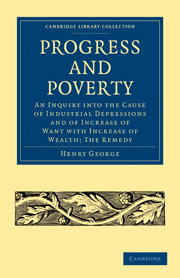 Progress and Poverty
Progress and Poverty Book contents
- Frontmatter
- PREFACE TO FOURTH EDITION
- Contents
- INTRODUCTORY
- BOOK I WAGES AND CAPITAL
- BOOK II POPULATION AND SUBSISTENCE
- BOOK III THE LAWS OF DISTRIBUTION
- BOOK IV EFFECT OF MATERIAL PROGRESS UPON THE DISTRIBUTION OF WEALTH
- BOOK V THE PROBLEM SOLVED
- BOOK VI THE REMEDY
- BOOK VII JUSTICE OF THE REMEDY
- BOOK VIII APPLICATION OF THE REMEDY
- Chapter I Private property in land inconsistent with the best use of land
- Chapter II How equal rights to the land may be asserted and secured
- Chapter III The proposition tried by the canons of taxation
- Chapter IV Indorsements and objections
- BOOK IX EFFECTS OF THE REMEDY
- BOOK X THE LAW OF HUMAN PROGRESS
- CONCLUSION
- INDEX
Chapter I - Private property in land inconsistent with the best use of land
Published online by Cambridge University Press: 07 September 2011
- Frontmatter
- PREFACE TO FOURTH EDITION
- Contents
- INTRODUCTORY
- BOOK I WAGES AND CAPITAL
- BOOK II POPULATION AND SUBSISTENCE
- BOOK III THE LAWS OF DISTRIBUTION
- BOOK IV EFFECT OF MATERIAL PROGRESS UPON THE DISTRIBUTION OF WEALTH
- BOOK V THE PROBLEM SOLVED
- BOOK VI THE REMEDY
- BOOK VII JUSTICE OF THE REMEDY
- BOOK VIII APPLICATION OF THE REMEDY
- Chapter I Private property in land inconsistent with the best use of land
- Chapter II How equal rights to the land may be asserted and secured
- Chapter III The proposition tried by the canons of taxation
- Chapter IV Indorsements and objections
- BOOK IX EFFECTS OF THE REMEDY
- BOOK X THE LAW OF HUMAN PROGRESS
- CONCLUSION
- INDEX
Summary
There is a delusion resulting from the tendency to confound the accidental with the essential—a delusion which the law writers have done their best to extend, and political economists generally have acquiesced in, rather than endeavored to expose—that private property in land is necessary to the proper use of land, and that to again make land common property would be to destroy civilization and revert to barbarism.
This delusion may be likened to the idea which, according to Charles Lamb, so long prevailed among the Chinese after the savor of roast pork had been accidentally discovered by the burning down of Ho-ti's hut—that to cook a pig it was necessary to set fire to a house. But, though in Lamb's charming dissertation it was required that a sage should arise to teach people that they might roast pigs without burning down houses, it does not take a sage to see that what is required for the improvement of land is not absolute ownership of the land, but security for the improvements. This will be obvious to whoever will look around him. While there is no more necessity for making a man the absolute and exclusive owner of land in order to induce him to improve it, than there is of burning down a house in order to cook a pig; while the making of land private property is as rude, wasteful, and uncertain a device for securing improvement, as the burning down of a house is a rude, wasteful, and uncertain device for roasting a pig, we have not the excuse for persisting in the one that Lamb's Chinamen had for persisting in the other.
- Type
- Chapter
- Information
- Progress and PovertyAn Inquiry into the Cause of Industrial Depressions and of Increase of Want with Increase of Wealth; The Remedy, pp. 357 - 361Publisher: Cambridge University PressPrint publication year: 2009First published in: 1881


